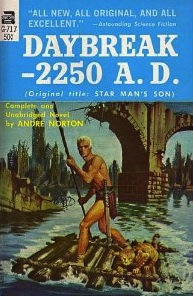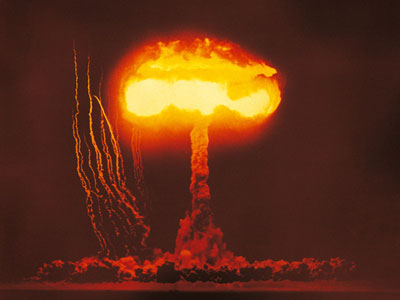I’ve read three 1952 post-apocalyptic novels for this series - The Long Loud Silence, and two books that are so similar that they can be dealt with in a single post: Star Man’s Son, by Andre Norton, and Vault of the Ages, by Poul Anderson. Both of these books are basically fantasy/neo-barbarian novels set hundreds of years after the North American continent has been ravaged by nuclear war. Both feature late teenage boys defying their elders and seeking out the lost knowledge of the god-like-but-fallen pre-apocalyptic ancestors, ancestors who held so much knowledge, but squandered it in a catastrophic nuclear war. Both feature climactic battles among various tribes, and finish with grand peace settlements (catalyzed by the boy heroes and accompanied by lengthy speeches) as humanity tries to recover the lost secrets of technology.
 I’ll admit straight-out that I’m biased here - with the exception of Tolkien and the original Dragonlance series, I’m not especially fond of fantasy novels. On top of that, these two books by Norton and Anderson (like the Harry Potter novels) are clearly aimed at readers in the same age group as the novels’ protagonists, in this case, sixteen year-old boys. I don’t have a problem with books aimed a teens, but the result here is some very black and white moralizing (Norton laments that men can’t live without war, while Anderson’s target is ignorance and superstition) and some extremely stilted dialogue, like this gem from Star Man’s Son:
I’ll admit straight-out that I’m biased here - with the exception of Tolkien and the original Dragonlance series, I’m not especially fond of fantasy novels. On top of that, these two books by Norton and Anderson (like the Harry Potter novels) are clearly aimed at readers in the same age group as the novels’ protagonists, in this case, sixteen year-old boys. I don’t have a problem with books aimed a teens, but the result here is some very black and white moralizing (Norton laments that men can’t live without war, while Anderson’s target is ignorance and superstition) and some extremely stilted dialogue, like this gem from Star Man’s Son:”Together,” Fors breathed, “we would make such a nation as this land has not seen since the days of the Old Ones!”
“No, not a nation such as the Old Ones knew!” Arskane’s answer was sharp. “They were not one body - for they knew war. And out of that warfare came what is today. If the the body grows together again it must be because each part, knowing its own worth and taking pride in it, recognizes the other two. And color of skin, or eyes, or the customs of a man’s tribe must mean no more to strangers...”
Ah, the idealism of youth, before cynicism and disillusionment set in... It’s a nice sentiment, but neither book really moves beyond such sentiment. They never tackle more difficult questions. Why do we tend to hate outsiders in the first place? Does superstition only thrive when we fear technology, or can people who profess allegiance to rationality be hopelessly superstitious at the same time? Maybe nuclear war really will draw all of surviving humanity together in peace and brotherhood (especially if there someone gives a big speech a la William Wallace in Braveheart), but consider me skeptical.
 Given all that, like the Harry Potter novels, Norton and Anderson do present fun, well-told stories (as long as you ignore some of the Conan the Barbarian dialogue), and their books are part of an important post-apocalyptic subgenre - the reversion to Tribal Stage, to put it in Spore terms. (The outstanding example of this type is the much more sexual, 1964 novel Davy.) In Star Man’s Son, a boy leaves his mountain tribe after a social snub limits his future prospects. He wanders off to explore a ruined city of the Old Ones. On the way he gains a buddy by saving the life of a youth from another tribe, he see the wrecked wonders of pre-apocalyptic society, he fights the hideous mutants that inhabit the cities, is captured by another tribe, etc. etc. and finally helps unite the fractious human tribes in battle against the mutants, the Beast Things who have left their city dwellings in search of conquest.
Given all that, like the Harry Potter novels, Norton and Anderson do present fun, well-told stories (as long as you ignore some of the Conan the Barbarian dialogue), and their books are part of an important post-apocalyptic subgenre - the reversion to Tribal Stage, to put it in Spore terms. (The outstanding example of this type is the much more sexual, 1964 novel Davy.) In Star Man’s Son, a boy leaves his mountain tribe after a social snub limits his future prospects. He wanders off to explore a ruined city of the Old Ones. On the way he gains a buddy by saving the life of a youth from another tribe, he see the wrecked wonders of pre-apocalyptic society, he fights the hideous mutants that inhabit the cities, is captured by another tribe, etc. etc. and finally helps unite the fractious human tribes in battle against the mutants, the Beast Things who have left their city dwellings in search of conquest.Vault of the Ages also deals with tribes inhabiting a ruined North American continent. War threatens from the north, in the form of an invading tribe. A group of independent-minded boys defy their elders and break a taboo their society has against visiting the cities of the ancients, where dangerous hidden secrets lie. By breaking the taboo and saving their people with technology of the ancients, the boys show that knowledge and technology are not inherently bad - they are what humans make of them.
Norton (who was actually Alice Norton, writing under a pen name that would sell better with teenage boys) and Anderson were extremely prolific, successful writers with a huge fan base. They can clearly tell a good story, but these books aren’t much more than that.
Next up in our post-apocalyptic survey: 1953, and Arthur C. Clarke's majestic Childhood's End, which isn't really post-apocalyptic until the very end - however, it fits with my Neanderthal-inspired theme of human extinction.

Read the feed:






Comments